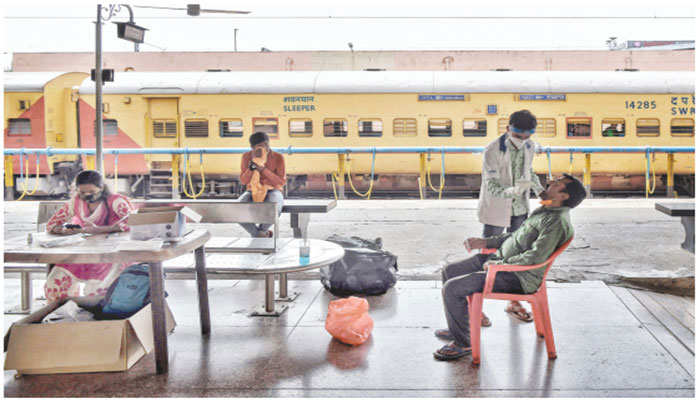Vatican staff who refuse vaccination could be fired
VATICAN CITY: Vatican staff who refuse to be vaccinated against Covid-19 could be sacked under a decree made public on Thursday by the city state, which employs around 5,000 people.
An employee must have a documented medical reason for refusing a jab or face “consequences of various degrees which may go as far as the termination of employment”, according to the text.
The document, which cites a 2011 Vatican law, also concerns job applicants, saying the Holy See may not hire them if they refuse to be vaccinated.
“Refusing vaccination could also be a risk for others (and) seriously increase risks to public health,” it says. The same document also details fines of between 25 and 50 euros ($30-60) for failing to wear a mask or to observe social distancing, and up to 1,500 euros for breaking quarantine rules.
The Vatican began vaccinating its employees for free last month. Pope Francis, 84, and his 93-year-old predecessor pope Benedict XVI have both received the jab.
Meanwhile, around half of South Africa’s population may have already been infected by coronavirus, a figure far higher than the documented tally, a study and analysis of death figures suggest.
Samples taken from almost 5,000 blood donors across four South African provinces in January showed that between 32 and 63 percent had antibodies to the coronavirus.
The figure compares with clinically confirmed case rates of just two to three percent, according to South African research that was released online last week, but has not yet completed peer review.
The numbers could be understated, said lead investigator Marion Vermeulen of the South African National Blood Service. People with confirmed or suspected Covid-19 are unable to donate blood for 14 days, and therefore less likely to be sampled, she explained.
Antibodies are a telltale of an individual’s exposure to the virus, but not a confirmation that the person has fallen sick from it. Most antibodies were detected in the Eastern Cape and KwaZulu-Natal provinces.
Both were epicentres of South Africa’s second infection wave when it started in December. Officially, South Africa has recorded close to 1.5 million coronavirus cases, of which just under 48,500 have been fatal -- the highest toll in Africa.
But emerging data suggests this figure is under-estimated, a statistician says. According to the South African Medical Research Council (SAMRC), more than 140,000 excess natural deaths have occurred since May last year.
The SAMRC does not give details as to the cause of these extra deaths. But the chief statistician with leading private medical insurer Discovery said that, based on his observations, around 90 percent of those extra fatalities are attributable to Covid-19.
If so, the real death toll from coronavirus in South Africa would exceed 120,000, chief actuary Emile Steep told AFP. Steep estimates that South Africa’s Covid-19 mortality stands around 0.4 percent -- a figure derived from an Infection Fatality Rate published by London’s Imperial College for modelling.
“Covid deaths are under-reported in almost every single country in the world,” Steep said in a phone interview on Wednesday. “Many people who are vulnerable to Covid have a lot of other conditions... so the cause is always hard to define.”
It is also easy to misrecord deaths at the height of a pandemic, when “medical staff (are) running around trying to save lives”, he added. The South African variant of the coronavirus, which is more transmissible and more resistant to existing vaccines than its original form, accounts for some 90 percent of the country’s second wave of cases, scientists say.
Life expectancy in the United States fell by a whole year in the first half of 2020 as the Covid-19 pandemic started to grip the country, official figures showed on Thursday. Life expectancy at birth for the total US population was 77.8 years, declining by a year from 78.8 in 2019, the Centers for Disease Control and Prevention (CDC) said.
Minorities were the hardest hit, with life expectancy decreasing three years for non-Hispanic Blacks and nearly two years for the Hispanic population.
Life expectancy at birth in the first half of last year was the lowest level since 2006, the report said, though it said the figures were provisional as the US continues to count the cost of the pandemic.
The figures “do not reflect the entirety of the effects of the Covid-19 pandemic in 2020, or other changes in causes of death, such as the increases in provisional drug overdose deaths,” it said.
Minorities have suffered high Covid fatalities partly due to employees who cannot work from home, larger households and poorer access to health care including testing. The country has so far registered 490,000 coronavirus deaths, by far the highest national death toll anywhere in the world.
-
 Eric Dane’s Friends Initiate GoFundMe To 'support' His Two Daughters After His Death At 53
Eric Dane’s Friends Initiate GoFundMe To 'support' His Two Daughters After His Death At 53 -
 Internet Erupts After Candace Owens Claims Elon Musk And Sam Altman Are ‘not Human’
Internet Erupts After Candace Owens Claims Elon Musk And Sam Altman Are ‘not Human’ -
 Will Princess Beatrice, Eugenie Stay In Contact With Andrew? Source Speaks Out
Will Princess Beatrice, Eugenie Stay In Contact With Andrew? Source Speaks Out -
 ‘AI Revolution Is Coming Fast & US Has No Clue,’ Bernie Sanders Warns Of Speed Of Disruption
‘AI Revolution Is Coming Fast & US Has No Clue,’ Bernie Sanders Warns Of Speed Of Disruption -
 Hong Kong Touts Stability,unique Trade Advantages As Trump’s Global Tariff Sparks Market Volatility
Hong Kong Touts Stability,unique Trade Advantages As Trump’s Global Tariff Sparks Market Volatility -
 ‘Miracle On Ice’ Redux? US Men Chase First Olympic Hockey Gold In 46 Years Against Canada
‘Miracle On Ice’ Redux? US Men Chase First Olympic Hockey Gold In 46 Years Against Canada -
 Friedrich Merz Heads To China For High Stakes Talks In An Effort To Reset Strained Trade Relations
Friedrich Merz Heads To China For High Stakes Talks In An Effort To Reset Strained Trade Relations -
 Astronauts Face Life Threatening Risk On Boeing Starliner, NASA Says
Astronauts Face Life Threatening Risk On Boeing Starliner, NASA Says -
 Hailey Bieber Reveals How Having Ovarian Cysts Is 'never Fun'
Hailey Bieber Reveals How Having Ovarian Cysts Is 'never Fun' -
 Kayla Nicole Looks Back On Travis Kelce Split, Calls It ‘right Person, Wrong Time’
Kayla Nicole Looks Back On Travis Kelce Split, Calls It ‘right Person, Wrong Time’ -
 Prince William And Kate Middleton Extend Support Message After Curling Team Reaches Olympic Gold Final
Prince William And Kate Middleton Extend Support Message After Curling Team Reaches Olympic Gold Final -
 Nvidia CEO Praises Elon Musk, Calls Him An ‘extraordinary Engineer'
Nvidia CEO Praises Elon Musk, Calls Him An ‘extraordinary Engineer' -
 Shia LaBeouf's Mugshot Released After Mardi Gras Arrest On Battery Allegations In New Orleans
Shia LaBeouf's Mugshot Released After Mardi Gras Arrest On Battery Allegations In New Orleans -
 Timothee Chalamet Felt '17 Again' After Reunion With 'Interstellar' Director Christopher Nolan
Timothee Chalamet Felt '17 Again' After Reunion With 'Interstellar' Director Christopher Nolan -
 Conan O'Brien Speaks First Time After Rob Reiner's Killing
Conan O'Brien Speaks First Time After Rob Reiner's Killing -
 Giant Tortoise Reintroduced To Island After Almost 200 Years
Giant Tortoise Reintroduced To Island After Almost 200 Years




